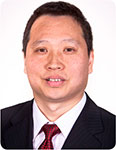Coal seam gas associated water treatment and management—opportunities and limitations
Huanfei Jia A and Johann Poinapen AMWH
The APPEA Journal 53(1) 185-192 https://doi.org/10.1071/AJ12015
Published: 2013
Abstract
Coal seam gas (CSG) is a new major export for Australia. The production of CSG releases a significant amount of brackish water to the surface, known as associated water. Queensland’s Department of Environment and Heritage Protection (DEHP) has predicted that the peak yearly flow of the associated water could range between 100-280 gigalitres (GL) per year. This presents a major challenge to the CSG industry in water and its by-product (brine) management.
CSG water quality varies across regions, but is typically high in total dissolved solids, bicarbonate, hardness, and silica. Consequently, CSG water without treatment is unsuitable for beneficial uses. To date, reverse osmosis (RO) desalination processes with suitable pre-treatment steps have been employed to remove elevated salts and other compounds before CSG water can be used beneficially. One type of beneficial reuse of the treated water that has gained acceptance and prominence in recent times is the irrigation of agricultural crops and forestry.
RO brine, a highly saline stream, requires a managed response to ensure a socially, environmentally and financially sound outcome. Conventional evaporation in brine ponds is not considered favourably under existing government directions and, consequently, alternative solutions are sought. Thermal processes, such as brine concentrators, have been used in the treatment of CSG RO brine. The resulting high-quality distillate produced by thermal processes can be used in a number of applications along with a greater proportion of water recovered from such processes.
This peer-reviewed paper concludes that a thermal process in conjunction with a high-recovery RO membrane plant, configured as a hybrid membrane/thermal configuration, is probably a suitable solution to meet policy direction by improving system recovery as a precursor to advance associated water treatment and brine management. The discussion is generated out of MWH’s experience with CSG water treatment and management processes, which totals a number of significant projects in the CSG industry.

Dr Huanfei Jia is principal process engineer—water at MWH Australia. With 20 years of working in the water-engineering field, Huanfei’s experience spans a wide range of areas, including consultancy and EPCM engineering of projects in seawater desalination, wastewater reclamation, and wastewater and potable-water treatment. Huanfei has predominately worked in industrial wastewater sectors, such as CSG, mining, steel, and power generation fields. He is familiar with advanced membrane technologies such as MF/UF, reverse osmosis, membrane bioreactors (MBRs), and brine concentrators. Zero liquid discharge (ZLD) of high-saline brine management also forms part of his expertise. Huanfei holds a PhD in chemical engineering from Curtin University (1997-2000), and a chemical engineering degree from Xian University of Architecture and Technology, China (1990). At his previous employer, WorleyParsons, Huanfei was a process group manager. Member: Australian Water Association (AWA). Huanfei.Jia@au.mwhglobal.com |

Dr Johann Poinapen, CPEng, RPEQ (registered professional engineer of Queensland), presently works as the Asia-Pacific industrial water leader for MWH Global. In his role, Johann has many interactions with clients, consultants, and other stakeholders in the water industry; both for the municipal, and energy and resources sectors. Johann is heavily involved in responding to the needs of clients by providing the best water-treatment expertise available in MWH globally. Johann is a chartered professional chemical engineer, and has more than 15 years of experience in water engineering and management. He received his PhD from the University of Cape Town, on the treatment of mine-affected water. Johann has worked in mines around the world, performing pilot- and full-scale treatment of mine water using various technologies and processes. His expertise also lies in process modelling, water chemistry, membrane filtration, and brine treatment and management. Johann.Poinapen@au.mwhglobal.com |


